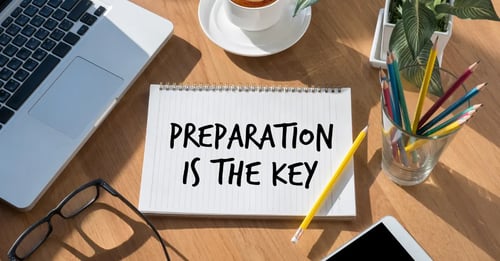8 min read
How to Study for the GED: 6 Proven Tips for 2025
By: Essential Education Team on January 15, 2025 at 11:29 AM

Proper preparation is key to successfully passing the GED. It is important to go beyond simply studying the required subjects and focus on understanding what types of questions will be asked, how they will be asked, and why. The exam doesn’t measure how much you know but how you apply what you know. Although it may seem intimidating, knowing what to expect builds confidence on test day. In this article, you will learn valuable information and simple study tips to help you prepare for the GED effectively.

Learn About GED Question Content and Quantity
The GED exam consists of four subjects: Reading/Writing, Math, Science, and Social Studies. The test usually takes about 7-8 hours to complete. Testers can take these subject exams one at a time or all at once. Let’s take a closer look at what to expect within each section.
The Reading and Writing portion of the GED will ask testers to answer 46 questions in 150 minutes. Students will have 45 minutes for the written essay portion. Reading and Writing test topics include Reading for Meaning (comprehension, main idea, and generalization), Identifying and Creating Arguments (finding the author's tone/opinion and purpose for writing), and Grammar/Language (capitalization, sentence structure, common word use, and vocabulary).
The Math portion of the GED will ask 46 questions in 115 minutes. Formula sheets and an on-screen calculator will be allowed for some, but not all, questions. The test proctor will let you know when you can use these resources. Math test topics include Basic Math, Geometry, Basic Algebra, and Graphs/Functions. Many students consider the math section of the GED to be one of the most challenging to pass. Over 55% of the math questions are algebra-related. Because these questions account for most of the exam, spending extra time studying this topic is wise.
The Social Studies section will allow testers 70 minutes to answer 35 questions. Social Studies topics include Reading for Meaning in Social Studies, Analyzing Historical Events and Arguments in Social Studies, and Using Numbers and Graphs in Social Studies. The Social Studies section is based on reading passages about Geography, Economics, and U.S. History. However, the majority of the questions will relate to Civics and Government.
The GED Science exam has a similar structure. Testers will be asked to answer 35 questions within 90 minutes. A formula sheet and calculator are allowed as directed. Science test topics include Reading for Meaning in Science, Designing and Interpreting Science Experiments, and Using Numbers and Graphs in Science. The test questions relate to texts about Earth and Space and Physical and Life Sciences.
One of the best ways to prepare for GED is with practice questions. As you study for the GED, remember that the test-makers are assessing your ability to think critically. Focus on carefully reading test passages and use logic and reasoning to answer questions. Building strong reading comprehension and application skills will better prepare you for all sections of the GED. Reading is the key to passing the high school equivalency exams.
GED Question Type and Scoring
The GED exam will ask questions in a variety of ways. While the majority of the questions will be multiple choice, testers should also expect drag-and-drop, fill-in-the-blank, and radio button questions. Some questions require more than one answer. The Reading and Writing section also asks one essay question. Both in-person and virtual GED testing is taken on a computer.
The test makers encourage students to think logically and apply strong problem-solving skills but do not expect perfection. The GED is much easier than you might think. You can miss over half of the questions within each subject and still pass. Students need a minimum score of 145 out of 200 on each subject exam. You get one hundred points just for starting the test! You must pass all subject exams to earn a GED diploma.
The GED is not the SAT. The purpose and structure of these two exams are very different. Many believe the GED is easier than the SAT, but some colleges and universities may ask GED graduates to take the SAT or ACT to determine proper class placement.

6 GED Study Skills and Tips
On average, students spend about 3 months studying for the GED exam. Just like physical exercise, study is something many people avoid. Making your brain workout fun, active, and engaging is important to get started and keep going. How do you do that? Here are a few general tips to boost your motivation and excitement about studying for the GED.
1. Change Your Mindset
Learning doesn’t happen to you; it happens in you. When you learn something new, you change your brain chemistry. Just like your body needs exercise to stay healthy, your brain must be active to grow. You have to practice to keep it strong. That’s the definition of study: exercise for your brain.
2. Make Connections
It can be frustrating when your studies feel irrelevant to you or your life. Many students ask, “Why do I need to know this?” or “When will I ever use this?” For learning to be effective, it must be meaningful. What does that look like?
You may be surprised to find that you already use many of the skills tested on the GED. For example, you might not think you use basic algebra daily, but you do! Every time you set a budget, pay bills, or follow a recipe, you use fundamental algebraic skills. You might not write out an equation, but the process is already at work in your mind. Push yourself to make connections between test prep and everyday life skills. Studying for and passing the GED is the gateway to better education and career opportunities. Look for ways to link what you are learning to what you will do after you’ve earned your GED diploma.
3. Make it Personal
Each of us has different needs when it comes to study and test-taking. While we don’t always have control over what and how information is presented, we can control how we study it. Here are a few suggestions to personalize your GED study.
-
Work at your own pace. When studying on your own, you’re in control. Focus on what you need to know and when you need to know it. Spend as much or as little time as required to gain full understanding.
-
Master material. Moving on before you are ready can stall your progress and cause frustration. This is especially true in GED subjects like Math. You need to fully master basic skills like multiplication and division before tackling harder problems. Pick something to work on and stick with it. Do not move forward until you know you’ve got it.
-
Focus on your strengths. Start strong to build confidence. What’s your least challenging GED subject? Beginning with your best subject will help you stay motivated, progress faster, and build helpful study habits before you move on to more difficult material.
-
Address your specific needs. Fast-track your GED preparation by focusing on the things you struggle with the most. GED Practice Tests are a great way to find personal learning gaps. You will discover exactly what you need to work on while moving past the content you already understand.
-
Review. Even if you’re progressing, regularly reviewing material will strengthen your understanding and prepare you for harder questions and concepts as you go.
4. Track Your Progress
Immediate feedback is essential to learning. The more specific and meaningful the response, the faster we learn. You need to know where you stand. No one likes to see missed questions, but knowing where your weak spots are is the first step to strengthening them. Quality study requires checking for understanding and working to address specific needs. In addition to regular quizzes and practice exams, be sure to track your study time. Even when disappointed by the results, celebrate your progress and reward yourself for the effort you put into GED test prep.
5. Boost Your Memory
While the GED exam is not based on memorization and recall, it’s important to memorize a few key processes, test-taking strategies, and steps to solve problems. Here are some things you can do to improve your memory when preparing for the GED.
-
Over-learn: Always over-learn the material. You might think you understand something right away, but that’s often short-term memory. Practice and review to build confidence and long-term memory.
-
Use your time wisely: Slow down! You can forget something quickly if you attempt to learn something at a rapid pace. Check for full understanding and make sure you are ready to move on. This includes reading all test directions, carefully examining reading passages, and knowing exactly what the question is asking before jumping in to answer.
-
Take breaks: Pause between lessons (and exam sections) to give your brain time to absorb what you’ve learned. Spaced learning provides a quick boost of energy and improves your speed and accuracy going forward.
-
Break it up: Divide big concepts or lengthy material into bite-sized chunks. Separate information into sections in your head and in your notes. This will allow you to better organize and retain new information.
-
Sleep: Quality sleep improves memory. Studying right before you go to bed–and getting enough sleep–will help you better recall what you’ve learned and strengthen your overall understanding.
6. Create a Study Space
Designate a specific place to study. Your personal study space should be adjusted to meet your unique needs. Even if it’s just a different chair in the living room or the end of your kitchen table, the change in location tells your brain it's time to focus. Consider noise-canceling headphones and silencing notifications to avoid distractions. Share with friends and family that preparing for the GED is important, and ask for support during your study time.

Studying for and passing the GED is simpler than you think. Once you understand what’s on the exam and how the test-makers will ask the questions, you will become a more confident test taker. A few basic study tips will arm you with the tools you need to succeed. A personalized GED prep program that allows you to work on your own time at your own pace, according to your unique learning needs, will get you test-ready in no time. With a positive attitude and the right tools, you can pass the GED!

